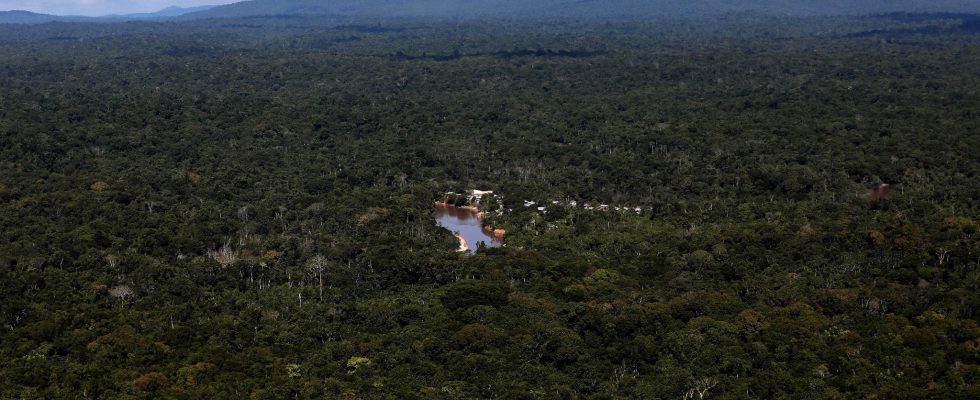Is it time for de-escalation? After verbal escalation and repeated provocations, Guyana and Venezuela will not cross the red line. Thursday, December 14 in Saint Vincent and the Grenadine, they agreed not to use “force against each other”. The subject of the dispute: their historical dispute over the territory of Essequibo, administered by Georgetown and claimed by Caracas. Behind the promise to “refrain in words, in deeds, from intensifying any conflict”, Guyanese Presidents Irfaan Ali and Venezuelan Nicolas Maduro remain stuck to their positions.
This summit has the merit of reducing tension after vigorous declarations made by both sides. Nicolas Maduro, head of the authoritarian regime in Venezuela since 2013, has continued his provocations against his neighbor. Starting with the organization of the referendum on the annexation of Essequibo, one of the five questions submitted to the population. More than 95% voted yes. In the process, the autocratic president brandished a red file before the members of his government: the bill aimed at the integration of the Essequibo. He even called for the issuance of new identity cards to residents. Enough to make his Guyanese counterpart furious.
If Venezuela wants to get its hands on the Essequibo, it is following the oil tenders by Guyana launched in September. On the territory of 160,000 km2, the American company ExxonMobil discovered a large oil deposit in 2015 in the territorial waters of Essequibo, which also has gas, gold and other minerals. Enough to arouse desire. In total, the reserves would be equivalent to 11 billion barrels of oil. Endowed with such spoils, Essequibo, which represents nearly 70% of Guyana’s territory and where around a fifth of its population lives (some 125,000 people), could make the former British protectorate, independent since 1966, an Eldorado of black gold. For comparison, Guyana’s reserves would be greater than those of Kuwait or Saudi Arabia.
Unsuccessful international arbitrations
Disputes over this territory date back a long time, but were put on hold for more than a century – until the discovery of this deposit. Flashback: Venezuela argues that the Essequibo River should be the natural border as it was in 1777, during the time of the Spanish Empire. Caracas believes that the Geneva agreement signed in 1966 – before Guyana’s independence – lays the foundations for a negotiated settlement which must continue. Guyana believes that the border between the two countries dates from the English colonial era and that it was ratified in 1899 by a Court of Arbitration in Paris. It is this border which is in force.
The affair could have ended there… But the controversy resurfaced in 1949, “when one of the negotiators of 1899 revealed in a posthumous note that the collusion of several arbitrators would have favored the United Kingdom“, remind our colleagues from Echoes. From then on, Venezuela has not stopped claiming its sovereignty over the Essequibo. No international arbitration has put an end to the discord.
In the joint declaration read Thursday, December 14 by the Prime Minister of the host country, Ralph Gonsalves, rotating president of the Community of Latin American and Caribbean States (CELAC), the two countries agree to resolve their dispute in “agreement with international law including the Geneva Agreement. But the joint declaration “notes that Guyana wants to continue the ongoing proceedings before the International Court of Justice” (ICJ) in The Hague, the highest court of the UN, and “notes that Venezuela does not recognize its jurisdiction” . The International Court of Justice (ICJ) ordered Caracas to “refrain from taking any action which would modify the situation prevailing in the territory in dispute”. However, Venezuela does not recognize this jurisdiction. The non-recognition of the ICJ was also one of the five points that the government included in its last referendum.
Washington and Brasilia play mediators
“The Minister of Foreign Affairs [brésilien] Mauro Vieira declared that peace was an essential condition for the economic development of the region”, underlines the Brazilian media G1. In the wake of the referendum, the eighth world power sent its soldiers to the border between Venezuela and Guyana in order to calm things down. Lula and his counterpart Nicolas Maduro called each other on Saturday December 9. A conversation during which the Brazilian president recalled “the long tradition of dialogue” between Latin American countries.
In the United States, American Secretary of State Antony Blinken, who thanked Brazil for its “leadership”, reaffirmed, Thursday, December 14, Washington’s position according to which “the land border between Venezuela and Guyana must be respected unless – or until – the parties reach a new agreement – or a competent legal body decides otherwise. At the beginning of December, the United States announced the start of “routine” military air exercises in Guyana. A way of reassuring their ally, where the ExxonMobil group is one of the main oil operators in this small country.
According to Venezuelan media Telesurtaken back by International mail : “It’s clear that […] the cession of the sovereignty of Guyana [au profit d’un ordre économique libéral] mainly benefits American companies.” One thing is certain: the Essequibo has not finished attracting desire.
